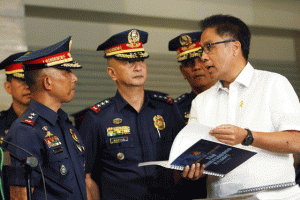“The chain of command in the PNP was violated. The President, the suspended CPNP Purisima and the former Director SAF Napeñas kept the information to themselves.”
This was the primary finding contained in the final report of a special probe team created to make heads and tails of Oplan Exodus, or the police operation that resulted in the death of 44 members of the Special Action Force (SAF) in Mamasapano, Maguindanao, on January 25.
“PNP” is the Philippine National Police and “CPNP” is “Chief PNP,” as the head of the country’s top police organization is called by officers and men.
Oplan Exodus “was defective from the very beginning,” the PNP-Board of Inquiry (PNP-BOI) said in its report.
Details of the report, which were submitted on Thursday to acting national police chief, Deputy Director General Leonardo Espina, were presented in full on Friday by Interior Secretary Manuel Roxas 2nd.
The three personalities referred to by the PNP-BOI were President Benigno Aquino 3rd, then-suspended PNP chief Alan Purisima and then-SAF commander, Director Getulio Napeñas Jr.
“[They] deliberately failed to inform the OIC [Officer-in-Charge of the] PNP [Espina] and the SILG [Roxas],” the report said.
“SILG” is Secretary of Interior and Local Government.
“The Chain of Command should be observed in running mission operations,” it added.
The PNP-BOI, headed by the chief of the PNP Criminal Investigation and Detection Group, Director Benjamin Magalong, found that the President “bypassed the established PNP Chain of Command” by dealing “directly” with Napeñas instead of with Espina.
“While the President has the prerogative to deal directly with any of his subordinates, the act of dealing with Napeñas instead of OIC-PNP Espina bypassed the established PNP Chain of Command,” the board said.
“Under the Manual for PNP Fundamental Doctrine, the Chain of Command runs upward and downward. Such Manual requires the commander to discharge his responsibilities through a Chain of Command,” the report said.
Purisima, who during congressional hearings admitted to having a hand in the planning of the mission while he was serving a suspension in connection with a graft case, has no place in the chain of command.
“Purisima could not be legally [forming] part of the Chain of Command by reason of his suspension,” the PNP-BOI report said.
The report added that Espina as the “senior commander” should have been informed about the planning and execution of Oplan Exodus in accordance with the fundamental doctrine of the national police that requires strict adherence to the chain of command.
“Such manual provides that it’s only in urgent situation when intermediate commanders may be bypassed. In such instances that intermediate commanders should be notified of the context of order as soon as possible by both the commanders issuing the order and the commander receiving it,” it said.
The report added that under Oplan Exodus, the chain of command in the PNP should have been the OIC of PNP, Deputy Director General Leonardo Espina as the senior commander and Napenas as the intermediate commander.
The report’s executive summary said Oplan Exodus, which was launched to serve arrest warrants against international terrorist Zulkifli bin Hir alias Marwan and bomb-maker Abdul Basit Usman, “[could] never be executed effectively.”
The PNP-BOI primarily blamed the PNP’s lack of coordination with the military and “the peace mechanism entities” for the tragic outcome of the mission.
It said the time-on-target coordination, which was planned by Napeñas “[did] not conform to the established and acceptable operational concepts and protocols of the PNP.”
“[Time on target or TOT] is applicable only to ordinary police operations,” according to the board. “Even AFP [Amed Forces of the Philippines] commanders asserted that the TOT concept is alien to the Armed Forces and runs counter to their established SOPs.”
“It appears that Napeñas’ primary consideration for adopting the TOT concept was operational security to reduce the risk of having Oplan Exodus compromised,” the PNP-BOI said.
The report said that when President Aquino directed Purisima and Napeñas to coordinate the operation with the military, the now sacked SAF commander raised the concern that the AFP might be compromised as some soldiers have intermarried with the locals.
The PNP-BOI report also took note of defective equipment used by the SAF troops during the mission.
“Some of the ordnance for M203 were defective. Although there were sufficient rounds of ammunition for each operating troop, the overwhelming strength of the enemy caused the troops to run out of ammunition,” it said.
The probers also noted that the hand-held radios were not designed for military use and “failed when submerged in water.” It also ran out of battery life “because of wear and tear.”
Malacañang said Purisima’s perceived closeness to the President will not save him from his involvement in the Mamasapano incident.
According to its deputy spokesperson Abigail Valte, the President maintains his position that charges will be filed against anyone based on evidence.
“The President has always been clear. We will follow where the evidence leads us. And so far, we don’t see any reason anybody could escape liability based on what other people say. But, again, it really should be based on evidence, which is why, in the first place, the [PNP-BOI] was called or convened,” she said.
Party-list representatives Terry Ridon (Kabataan) and Walden Bello (Akbayan) said the report proved that Aquino is guilty of a cover-up.
With Joel M. Sy Egco and Llanesca T. Panti


